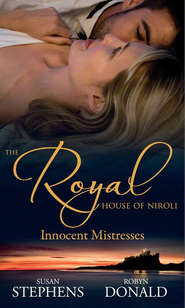По всем вопросам обращайтесь на: info@litportal.ru
(©) 2003-2024.
✖
A Forbidden Desire
Автор
Год написания книги
2018
Настройки чтения
Размер шрифта
Высота строк
Поля
‘When P—Mr McAlpine isn’t here I’ll get my own meals,’ Jacinta said.
Fran gave her an approving glance. ‘Good. There’s always salads and stuff like that in the fridge.’
Back in the bedroom, fortified by a salad sandwich and a banana, Jacinta unpacked her suitcases and set out her books along the back of the desk. Then, obscurely comforted by her familiar things, she changed into shorts and a light shirt and slathered herself in sunscreen. With a wide-brimmed straw hat crammed over her ginger curls, she set off to explore.
About three acres of garden dreamed around the house, sheltered by the hedge on all sides except the seaward one. Even the salt winds couldn’t get directly at it; pohutukawa trees leaned over both lawn and sand, forming a wide, informal barrier that would save Paul McAlpine from the indignity of having stray yachties peer into his house.
Seen between the swooping branches and dark, silver-backed leaves, the bay glittered, as blue as his eyes and as compellingly beautiful.
Jacinta wandered across the lawn and found a flight of steps that led out onto the sand, already sizzling under the hot November sun. Some people, she thought, remembering with a shudder the grim little house in which she’d spent most of the past nine years, had all the luck.
She didn’t regret giving up her studies to care for her mother. In spite of everything there had been laughter and joy in that farm cottage. Still, she couldn’t help thinking wistfully that her mother’s long, pain-racked purgatory would have been more bearable in a place like this.
Fishing a handkerchief from her pocket, she blew her nose. The last thing she wanted was for Cynthia Lyttelton to be still enduring that monstrous, unbearable agony and complete loss of autonomy, but her death had left an enormous gap.
For years Jacinta had made all the decisions, done all the worrying. Grief, and relief that it was all over, and guilt about that relief, and exhaustion, had formed a particularly potent cocktail, one that had rendered her too lethargic to realise that Mark Stevens had begun a campaign to control her life.
Picking up a stone, she straightened and skipped it across the water.
Looking back, her slowness to understand the situation still astonished her It had taken her three months to realise what was happening and leave the flat.
Another stone followed the first across the water.
With Gerard’s help she’d got through that with very little trauma, and doing his housework three days a week had helped her save enough money to see her through the summer holidays without working.
All in all it had been a hard year; she was probably still not wholly recovered from her mother’s death, but the crying jags were over, and the stress of trying to find some sort of balance, some firm place to stand, had gone. She’d come a long way in the last six months.
Oh, there were still problems, still decisions to be made. She had to work out what sort of life she wanted, and of course there was always money...
But for the moment she didn’t have to worry about any of that. She had another promise to her mother to fulfil, and three months in this perfect place to do it.
Lifting her face and half closing her eyes, she smiled into the sun. Light danced off her lashes, the film of moisture there separating the rays so that they gleamed like diamonds.
Living in the bach would have been perfect. She’d probably only have seen Paul once or twice in the three months, instead of finding herself practically cheek by jowl with him.
Still, she’d manage. She was much stronger than she’d been before, much better able to look after herself. And it didn’t really matter that she lusted a bit after Paul McAlpine. So, no doubt, did plenty of women. At least she recognised what she felt as straightforward physical hunger and didn’t mistake it for anything more important.
The ringing of small, melodious bells filled the air. Jacinta stopped, watching and remembering. Outside the window of the cottage where she’d lived with her mother was a cherry tree, and each spring her mother had waited for the tuis to come and glut themselves on the nectar.
Just ahead, beside a transparent veil of water that ran over the sand, stood a clump of flax bushes. Strappy leaves supported tall stems with bronze- and wine-coloured flowers, mere tubular twists of petals with dark stamens protruding from the tip.
Yet in those flowers glistened nectar, and a tui, white feathers bobbling at its throat, sat on the stem and sang his spring carillon.
When Paul said her name Jacinta yelped, whirling to say angrily, ‘Don’t do that, for heaven’s sake!’
Paul frowned. ‘Your nerves must be shot to pieces.’
‘No! I just wasn’t—I didn’t—’
‘It’s all right,’ he said, his voice deep and sure and strangely soothing.
As the tui broke off its song to indulge in a cacophony of snorts and wheezes, interspersed with the sound of a contented pig, Paul put a hand on her shoulder, grounding her until the sudden surge of panic died away to be replaced by a slow combination of emotions—keen pleasure, and peace, and an oblique foreboding.
Swiftly she stepped away. ‘Unusual birds you have here,’ she said, snatching at her composure. ‘Penguins that bray like donkeys, tuis that mimic pigs...’
‘That’s normal for both of them. Is it normal for you to jump like that whenever anyone comes up behind you?’
‘No, but I didn’t hear you and I suppose I am a bit tense. I thought that by now I’d be nicely ensconced in a bach with just the sea for company. Instead, I’ve been hijacked.’ She smiled tentatively and his frown disappeared, although his gaze was still keenly perceptive as it rested on her face. ‘Where is the bach, by the way?’
Dropping his hand, he nodded to where a road left the main one and ran over the headland to the south. ‘In the next bay,’ he said.
She nodded too, not quite knowing what to say. The tui forgot its barnyard imitations and went back to foraging for nectar. Jacinta enjoyed the iridescent sheen of its plumage as the thin stem swayed in the sunlight—greens and purples, blues and bronzes, brighter by far than oil on water.
Every sense she possessed was at full stretch, so that she heard with keen pleasure the susurration of the waves on the beach, felt the heat and the wind on her tender skin, inhaled salty air and tasted her own emotions in her mouth, a sharp delight edged with wanness.
Paul didn’t seem in a hurry to leave, so they watched the bird until Jacinta was unnerved enough by the silence to ask, ‘What’s the name of this bay?’
‘Homestead Bay.’
She laughed a little. ‘Of course. What a glorious place to grow up in.’
‘I’m sure it would be,’ he said calmly, ‘but I’ve only owned it for five years or so.’
A note in his voice steered her well away from that topic. Too late she remembered that he’d bought it after he’d been jilted by the lovely Aura. Stumbling slightly, she asked, ‘Is that the Coromandel Peninsula on the skyline?’
‘And Great Barrier Island.’
Gloating, her eyes dreamy, she murmured, ‘It’s so beautiful.’
‘I think so,’ he said smoothly.
Jacinta stiffened. However banal and ordinary his words, there always seemed to be a subtext, some oblique intonation or cool, fleeting amusement adding an extra meaning to what he said.
She couldn’t help but feel that in some subtle way Paul McAlpine neither liked nor trusted her.
And that was ridiculous, because she didn’t know the man well enough to interpret either his tone of voice or expression. As well, he was a lawyer, trained to keep his features under control.
Although she was prepared to bet that they’d never been exactly open and candid. There was too much self-discipline in that beautiful mouth, and in spite of their vivid colour his blue eyes were surprisingly opaque, hiding Paul McAlpine’s emotions very well.
She said abruptly, ‘Gerard said you’re a lawyer.’
‘Most of my work is in international law,’ he told her, a hint of reserve flattening his tone.
So he didn’t want to talk about it. Neither had Gerard. ‘Very high-powered,’ he’d said. ‘He deals with governments.’
Whatever that meant. As Paul’s career seemed to be off-limits, she said, ‘And is this a working farm?’
‘Certainly. It’s a stud; we breed Blonde d’Aquitaines, French beef cattle. We’d better go for a short tour to orient you.’











